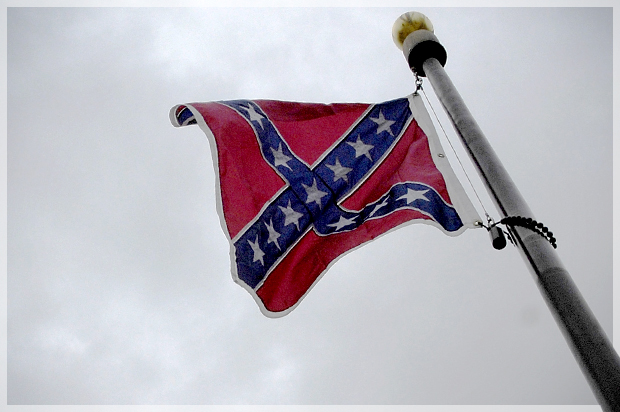South Carolina, a state that’s nearly 30% African-American, celebrates”Confederate Memorial Day” and proudly displays the flag of the Southern Confederacy at its statehouse in Columbia — a longstanding practice that’s under increasing fire following this week’s Charleston massacre, in which a white supremacist gunman is suspected of murdering nine black churchgoers.
In 2000, state lawmakers reached a “comprise” on the controversial symbol, voting to move the flag from the top of the dome to smack-dab in front of the statehouse on the front lawn. In the first state to secede from the Union in 1861, this was what passed for progress.
By now we are all familiar with the defensive refrain from supporters of the Confederate Flag: it’s heritage, not hate.
But that’s a load of crock. It’s been noted that after the Civil War, Confederate Vice President Alexander Stephens wrote a revisionist account entitled A Constitutional View of the Late War Between the States, which helped push the myth that the war was really about states’ rights.
According to a 2011 Pew Research poll, just nine percent of Americans had a positive reaction to the Confederate flag. But while the ranks of stars-and-bars fans may be thin nationally, much of the modern Republican Party, defined as it is by white Southern support, cannot bring itself to condemn the symbol of racial apartheid.
Republican South Carolina Senator and presidential candidate Lindsey Graham said following the massacre that although the flag “been used in a racist way” in the past, it remained “part of who we are,” shrugging off the symbolism in favor of “what’s in people’s heart.” Defending his state’s supposed “comprise,” Graham said “It works here, that’s what the Statehouse agreed to do.”
And remember: Graham is supposed to be one of the “sane” Republicans.
Republican politicians have stumbled over themselves to pander to GOP South Carolina primary voters at the expense of the truth, their fellow Americans and potential voters (granted, the 2012 primary garnered a pathetic 1% turnout from African-American voters) for entirely too long.
During a 2000 Republican primary debate in South Carolina, moderator Brian Williams asked, “does the flag offend you personally,” to which George W. Bush defensively retorted, “What you are you trying to get me to do is express the will of the people of South Carolina. Brian, I believe the people of South Carolina can figure what to do with this flag issue. It’s the people of South Carolina’s decision. I don’t believe it’s the role of someone from outside South Carolina and someone running for president to come into South Carolina.
Lost on Bush was the irony of citing states’ rights — long the doctrine of choice for segregationists and Confederate nostalgists — to defend South Carolina’s right to fly the stars and bars. His response was met with raucous support from the GOP crowd.
For his part, brother Jeb ordered the Confederate battle flag be taken down from Florida’s capitol building back in 2001, arguing that “the symbols of Florida’s past should not be displayed in a manner that may divide Floridians today.”
In 2008, both John McCain and Mitt Romney ran into trouble when they refused to cave to Confederate Flag fetishizers who then took out ads in the early primary state attacking them for speaking out against the hateful symbol.
McCain, learning his lesson from the infamously racist 2000 primary during which he delivered a tortured but typical defense, said “some view it as a symbol of slavery; others view it as a symbol of heritage. Personally, I see the battle flag as a symbol of heritage,” went on to apologize for his inability to forcefully denounce the flag, calling it one of the “worst decisions” he’d ever made.
McCain revealed the truth in the GOP’s struggle to admonish the flying of the Confederate Flag, recounting his own flip-flop, “[I]t could come down to lying or losing. I chose lying.”
So much for the Straight Talk Express.
In 2012, former House Speaker and advocate of child labor Newt Gingrich made clear his opposition to national demands that the flag be taken off public property, “I have a very strong opinion,” Gingrich said. “It’s up to the people of South Carolina.”
Arkansas governor Mike Huckabee defiantly declared that “outsiders” were not allowed to debate the Confederate Flag.
But there seems to be some hope that the 2016 primary may change.
Rick Perry, who supported Texas’ rejection of Confederate-flag license plates that was upheld by the Supreme Court this week, called the issue a state’s matter today but added that “I agree that we need to be looking at these issues as ways to bring the country together….And if these are issues that are pushing us apart, then maybe there’s a good conversation that needs to be had about [it].”
Gov. Nikki Haley, the state’s Republican governor who had previously defended not demanding the flags removal because no business owners had complained to her, said today, “I think the state will start talking about that again, and we’ll see where it goes.”
We shall see how 2016ers handle the GOP South Carolinan primary voters’ demands to proclaim state’s rights and let the Confederate Flag fly free.

